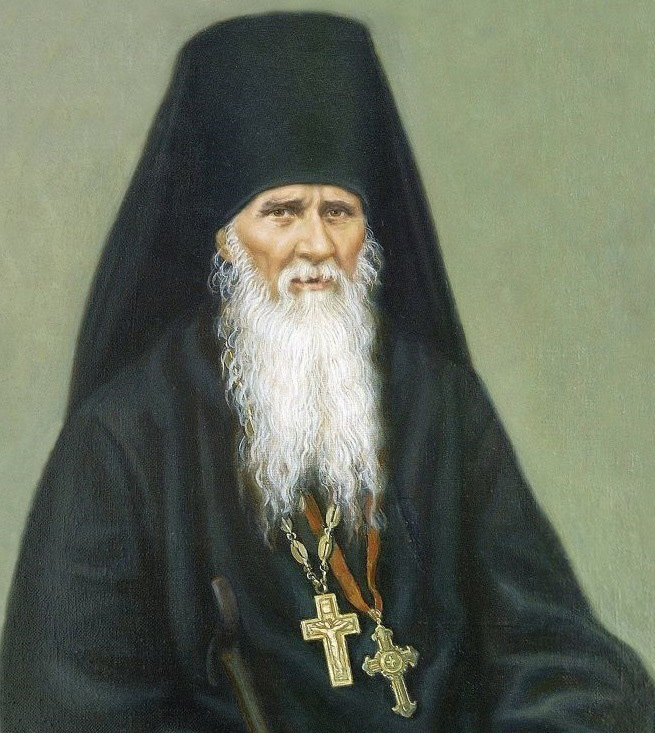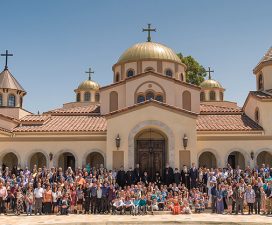 St. Ambrose of Optina (1812-1891) –
St. Ambrose of Optina (1812-1891) –
My child, know that in the last days hard times will come; and as the Apostle says, behold, due to poverty in piety, heresies and schisms will appear in the churches; and as the Holy Fathers foretold, then on the thrones of hierarchs and in monasteries there will be no men to be found that are tested and experienced in the spiritual life. Wherefore, heresies will spread everywhere and deceive many.
The enemy of mankind will act skillfully, and whenever possible he will lead the chosen ones to heresy. He will not begin by discarding the dogmas on the Holy Trinity, the divinity of Jesus Christ, or the Theotokos, but will unnoticeably start to distort the Teachings of the Holy Fathers, in other words the teachings of the Church herself.
The cunning of the enemy and his “tipics” (ways) will be noticed by very few — only those that are most experienced in spiritual life. Heretics will take over the Church, everywhere, and they will appoint their servants, and spirituality will be neglected. But the Lord will not leave His servants without protection. Truly, their real duty is persecution of true pastors and their imprisonment; for without that, the spiritual flock may not become captured by the heretics.
when you see in the Churches mocking of the Divine act, of the teachings of the Holy Fathers, and of God’s established order, know that the heretics are already present
Therefore, my son, when you see in the Churches mocking of the Divine act, of the teachings of the Holy Fathers, and of God’s established order, know that the heretics are already present. Be also aware that, for some time, they might hide their evil intentions, or they might covertly deform the divine faith, so that they better succeed by deceiving and tricking the inexperienced.
They will persecute pastors and the servants of God alike, for the devil who is directing the heresy cannot stand the Divine order. Like wolves in sheep skin, they will be recognized by their vainglorious nature, love for lust, and lust for power. All those will be betrayers, causing hatred and malice everywhere; and therefore the Lord said that one will easily recognize them by their fruits. The true servants of God are meek, brother-loving and obedient to the Church (order, traditions).
At that time, monks will endure great pressures from heretics, and the monastic life will be mocked. The monastic families will be impoverished, the number of monks will decrease. The ones remaining will endure violence. These haters of the monastic life, who merely have the appearance of piety, will strive to draw monks to their side, promising them protection and worldly goods (comforts), but threatening with exile those who do not submit. From these threats, the weak of heart will be very humiliated (tormented).
the faithful who possess no other virtues will receive wreaths for merely remaining steadfast in their faith
If you live to see that time, rejoice, for at that time the faithful who possess no other virtues will receive wreaths for merely remaining steadfast in their faith, according to the Word of the Lord, “Everyone who confesses Me before men, I will confess before My Heavenly Father”. Fear the Lord, my son, and don’t lose this wreath so as to not be rejected by Christ into the utter darkness and eternal suffering. Bravely stand in faith, and if necessary, joyfully endure persecutions and other troubles, for only then will the Lord stand by you…and the holy Martyrs and the Confessors will joyfully watch your struggle.
But, in these days, woe be to monks tied to possessions and riches, and who, for the sake of love of comfort, agree to subjugate themselves to the heretics. They will lull their conscience by saying: we will save the monastery, and the Lord will forgive us. Unfortunate and blinded, they are not even thinking that through heresies and heretics the devil will enter the monastery, and then it will no longer be a holy monastery, but bare walls from which Grace will depart forever.
God is more powerful than the devil, and will never abandon His servants
But God is more powerful than the devil, and will never abandon His servants. There will always be true Christians, till the end of time, but they will choose lonely and deserted places. Do not fear troubles, but fear pernicious heresy, for it drives out Grace, and separates us from Christ, wherefore Christ commanded us to consider the heretic and let him be unto thee as a heathen man and publican.
And so, strengthen yourself, my son, in the Grace of Christ Jesus. With joy, hasten to confession and endure the suffering like Jesus Christ’s good soldier who was told: “Be faithful unto death, and I will give you the wreath of life”.
______
(The Endtimes and New Collection of Writings)




This is happening right now, lead by academics and clergy at several activist sites and academic venues. They’re doing exactly what Saint Ambrose warned about.
Public Orthodoxy
https://publicorthodoxy.org/
The Wheel
https://www.wheeljournal.com/
Orthodox Christian Studies Center – Fordham University
https://www.fordham.edu/info/23001/orthodox_christian_studies_center
Orthodoxy in Dialogue
https://orthodoxyindialogue.com/
Huffington Ecumenical Institute – Loyola Marymount University
https://bellarmine.lmu.edu/ecumenical/
Here’s a perfect example of how these venues attack the Holy Fathers and the traditional teaching of the Orthodox Church, from the heretical venue Public Orthodoxy, run by George Demacopoulos and Aristotle Papanikolaou.
If we were to take this critique at face value, we could only conclude that all holy texts must be read metaphorically. “Metaphor” in the way the author uses the term means contextually relative; the texts were authoritative in the time and place they were written, but open to reinterpretation and contextualization in our own time.
Some of this is accurate of course. We recontextualize the tradition whenever we apply it to situations and circumstances that did not exist at the time it was written. But this is not what the author means. He wants to say that the entire tradition (holy texts and the teachings that emerged from — the tradition) is completely metaphorical, which is to say everything is subject to reinterpretation and recontextualization according to the values of the culture dominant at the time.
How do we know this? Because he labels anyone who resists his rigid determinism as “fundamentalist;” that those who refuse his hermeneutic that the holy texts are singularly metaphorical are afflicted with a psychological malady that renders them blind not only to the nature of the holy texts, but also to their own malady.
What we really see displayed here however, is the arrogance of the analyst, particularly the notion that hermeneutics can be forced into psychoanalytic categories in order to dismiss the ones the analyst disapproves of. Psychoanalysts are generally a prickly group who can’t even agree among themselves on the categories that define their own profession. He should stick to what he knows and leave the rest alone.
I don’t disagree with the Saint, the secularism/relativism of the usual suspects within “progressive” Orthodoxy, the ineptness of Dr. Vaseilios critique of “fundamentalism”, etc.
That said, the conflict within this Church of the East between the MP and EP is bringing out much misplaced passion. There is a whole lot of amateur (canon) lawyering and theologizing going on within the Ortho-blogosphere, usually along with “prooftexting” of St. Ambrose and other saints words such as those above. All this in the context of the MP’s and EP’s propaganda machines (though it must be admitted that the MP’s appears more efficient).
I say all this just to point to a bit of needed discernment around this or that prophetic word from wherever…
Which of collection of St Ambrose’s writings can this be found in? I did some searching to no avail…